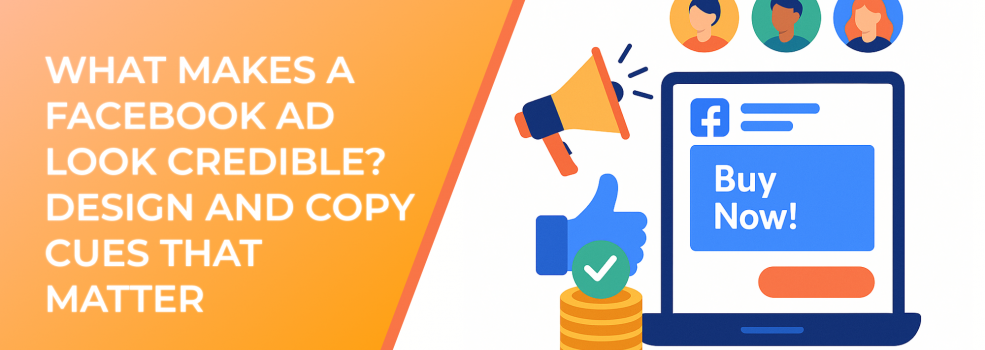In the fast-moving world of Facebook advertising, a single glance can determine whether your ad gets clicked or ignored. Users scroll quickly, and trust is earned or lost in an instant. That makes credibility a critical factor in ad success. In this article, we break down the design and copy elements that signal trust to your audience and how to use them effectively in your Facebook ad optimization strategy.
Why Ad Credibility Matters
According to a Meta internal study, ads perceived as trustworthy drive up to 1.7x higher engagement rates and up to 2x more conversions compared to ads that appear unprofessional or misleading. In the context of lookalike audiences, where you're trying to reach new prospects based on existing customer data, establishing trust fast is essential.
With competition increasing across every vertical, your ad's first impression—its visual and textual clarity—can determine whether it gets engagement or is skipped.
Key Design Cues That Signal Credibility
1. High-Quality Visuals
Before & after: two Facebook ad versions showing how clear design cues—testimonial snippet, brand mark, trust icons, and proper contrast—can shift an ad from generic to credible
Pixelated or generic stock photos can damage trust. Use sharp, relevant images or video thumbnails that are professionally designed and reflect your brand tone. If you're retargeting a warm audience or using custom audiences, they’ll expect a level of consistency in your creative.
2. Consistent Branding
Maintain consistent use of colors, logos, and brand fonts. This familiarity helps users quickly identify your business, especially when running ads across multiple placements. Facebook ad optimization begins with visual alignment.
3. Clean, Uncluttered Layouts
Avoid overwhelming your audience with too much visual noise. Use whitespace strategically to guide the viewer’s eye. Highlight key elements like product images, benefits, and CTAs.
4. Social Proof Elements
Incorporate testimonials, user-generated content, star ratings, or recognizable brand partnerships. These are strong credibility boosters. Data shows that including testimonials in Facebook ads can lead to a 15–25% increase in click-through rates (CTR).
Copywriting Techniques That Build Trust
1. Transparent Offers
Be clear about your product, price, and promotion. Avoid bait-and-switch tactics. Audiences are savvy and penalize deceptive ads with lower engagement.
2. Credible CTAs
Use action verbs that match your brand voice. CTAs like "Get Started," "See How It Works," or "Try for Free" work better than vague commands like "Click Here."
3. Specific and Relevant Headlines
Use precise language. For example, instead of saying "Improve Your Business," try "Boost Revenue with Our AI-Powered Scheduling Tool." Specificity increases both relevance score and ad recall.
4. Compliance and Clarity
Make sure you adhere to Facebook’s ad policies. Vague or exaggerated claims can get your ad flagged. Aligning your audience targeting with copy that feels respectful and informative ensures higher ad relevance diagnostics.
Measurable Impact of Credible Ads
Facebook ads enriched with credibility cues (testimonials, trust badges) outperform standard creative by up to 25% in CTR, boost conversion rate by 5–15%, and reduce cost‑per‑click
-
Credible ads lower CPMs by up to 20%, according to a 2024 AdEspresso study.
-
Ad relevance scores improve when users don’t hide or report your ads—a key metric impacted by trustworthiness.
-
Brands that focus on both creative testing and credibility cues report an average 35% better ROAS.
Best Practices Checklist
-
Use real customer quotes or metrics to build authority
-
A/B test visuals with and without social proof
-
Keep headlines under 40 characters for better mobile performance
-
Always match visuals with ad copy to avoid dissonance
Related Reading from LeadEnforce
To deepen your expertise, check out these related articles:
-
"How to Implement Facebook’s Value-Based Lookalike Audiences for Maximum Impact"
-
"How to Improve Campaign Performance Without Increasing Budget"
-
"Key Strategies for Facebook Ad Testing: What You Need to Know"
These articles will give you more tactical insights on audience creation, campaign scaling, and maximizing your advertising ROI with LeadEnforce.

